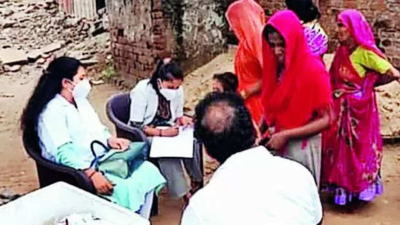- News
- Waterborne disease cases spiked after flood in Vadodara
Waterborne disease cases spiked after flood in Vadodara
Last month's flood in Vadodara led to a spike in waterborne diseases, especially acute diarrhoeal disease. The Vadodara Municipal Corporation mobilized teams for medical aid and preventive measures. Increased surveys identified more cases, leading to higher reported numbers initially. The situation is now improving as the number of daily cases declines.

Health workers in one of the city’s flood-affected areas
With nearly a quarter of the city under floodwater, sanitation and the risk of an outbreak had become a major concern.
Cleaning of affected areas was prioritized and home minister Harsh Sanghavi, who is also the minister in charge of Vadodara, visited the affected areas when they were being cleaned.
Cases of waterborne diseases - particularly acute diarrhoeal disease (ADD) - have been rising consistently.
In the aftermath of the flood, these numbers rose by more than three times on certain days, compared to before the flood. Between Aug 21 and 27, this number was between 43 and 70 cases. After the flood, the numbers rose to as high as 194 on a single day, Sep 2. Till Sep 10, the daily number of ADD cases remained over 101.
VMC medical officer (health) Dr Devesh Patel said all efforts were made to ensure there was no major outbreak. "The high number is also because our teams actively went on surveys in these areas and camped there to ensure all sick people got treatment and that preventive measures were in place," he said.
Patel added that the number of cases is also higher because more cases were being identified and enumerated by VMC teams. "Earlier, such patients may have never approached a doctor and hence were not part of the data," Patel added. The numbers have started going down again significantly since last week.
Sources said the increase was expected as water gets contaminated and living conditions are unsanitary in the immediate aftermath of floods. "Floodwater has sewage and other contaminants in it, which causes this situation," an official said.
End of Article
FOLLOW US ON SOCIAL MEDIA









